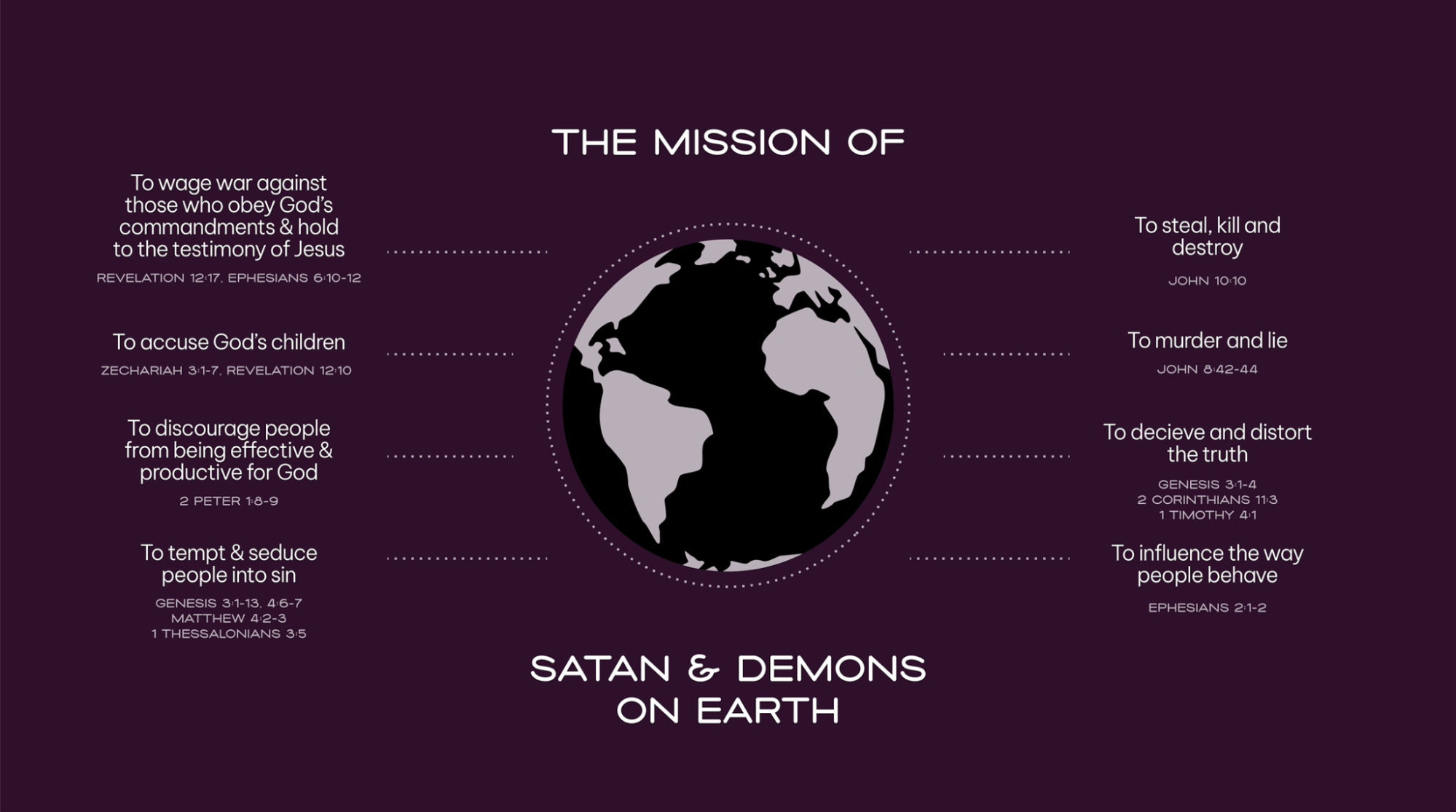
In his video, Rev. Brian Burke presents a number of Scriptures that indicate what the mission of Satan and the demons are on the earth.

1. To wage war against those who obey God’s commandments (Rev. 12:17; Eph. 6:10-12).
Revelation 12:17 shows Satan enraged with the followers of Christ, engaging in warfare against those who keep God’s commandments and hold to the testimony of Jesus. Ephesians 6:10-12 gives us further details on this kind of spiritual warfare, where believers are urged to put on the full armor of God to stand against the devil's schemes. The struggle is not against flesh and blood but against spiritual forces of evil. These passages underscore the reality of spiritual conflict, emphasizing that Satan actively opposes those who are faithful to God’s commandments, necessitating spiritual vigilance.
2. To accuse God’s children (Zech. 3:1-7; Rev. 12:10).
In Zechariah 3:1-7, Satan is seen as an accuser, standing at the right hand of Joshua the high priest to accuse him. Similarly, Revelation 12:10 refers to Satan as the “accuser of our brothers and sisters,” who accuses them before God day and night. These scriptures highlight Satan’s role as an accuser, seeking to bring charges against believers. He challenges their integrity before God. Satan attempts to undermine the righteousness and redemption of God’s children.
3. To discourage people from being effective and productive for God (2 Pet. 1:8-9).
In 2 Peter 1:8-9, believers are encouraged to have faith, virtue, knowledge, and love to prevent them from being ineffective and unproductive in their knowledge of Jesus Christ. Satan attempts to hinder spiritual growth and productivity in the lives of believers.The lack of these qualities, potentially influenced by Satanic deception or discouragement, can lead to a diminished effectiveness in serving God.
4. To tempt and seduce people into sin (Gen.3:1-13; Matt. 4:2-3; 1 Thess. 3:5).
In Genesis 3:1-13, we see Satan taking the form of a serpent, tempting Eve by contradicting God’s command and enticing her to sin. In Matthew 4:2-3, Satan tempts Jesus in the wilderness, offering alternatives to God’s plan. 1 Thessalonians 3:5 also acknowledges Satan’s role in tempting believers. These passages reveal Satan's strategy of seduction and temptation, aiming to lead people away from obedience to God and into sin.
5. To steal, kill, and destroy (John 10:10).
John 10:10 contrasts the intentions of the thief (often interpreted as Satan) with those of Jesus. While Jesus comes to give life abundantly, the thief comes only to steal, kill, and destroy. This verse encapsulates Satan’s destructive goals: to rob people of spiritual truth, bring about spiritual death, and destroy what is good and life-giving.
6. To murder and lie (John 8:42-44).
In John 8:42-44, Jesus describes Satan as a murderer from the beginning and the father of lies. This characterization underscores Satan’s opposition to the truth and his role in promoting falsehood, deceit, and destruction. His actions and influences are fundamentally opposed to the nature and truth of God.
7. To deceive and distort the truth (Gen. 3:1-4; 2 Cor. 11:3; 1 Tim. 4:1).
Genesis 3:1-4 records the first instance of Satanic deception, where the serpent distorts God’s words to deceive Eve. In 2 Corinthians 11:3, Paul expresses concern that believers’ minds may be led astray from a sincere and pure devotion to Christ, just as Eve was deceived. 1 Timothy 4:1 warns of deceiving spirits and teachings of demons. These scriptures highlight Satan’s role as a deceiver, twisting truth to lead people away from God.
8. To influence the way people behave (Eph. 2:1-2).
Ephesians 2:1-2 describes how people once walked following the ways of the world and the ruler of the kingdom of the air (a reference to Satan), indicating his influence over human behavior. This influence is characterized by disobedience and opposition to God’s ways. Satan is depicted as having a certain degree of authority over the unregenerate world, steering people towards sinful behaviors and attitudes.